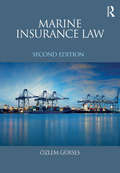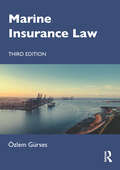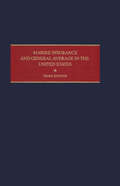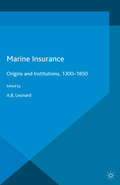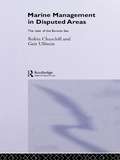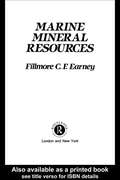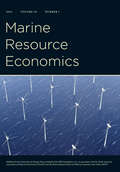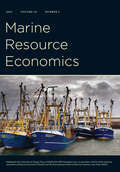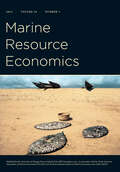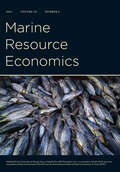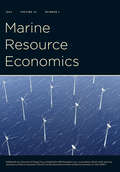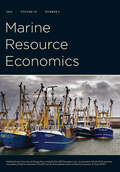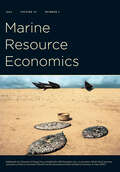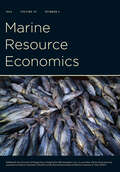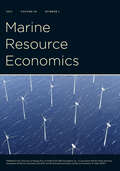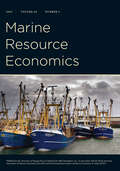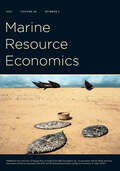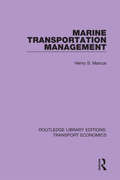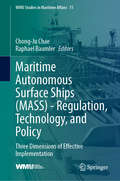- Table View
- List View
Marine Harvest: Leading Salmon Aquaculture
by Ryan Johnson David E. BellMarine Harvest has the leading position in salmon aquaculture. Aquaculture is very much a growth business, many believing it could play a major role in solving the world's growing need for protein. The CEO is considering three alternatives for taking advantage of his firm's dominant position. Expand production in Chile, produce value-added salmon products, or backward-integrate into the salmon feed business.
Marine Harvest: Leading Salmon Aquaculture
by Ryan Johnson David E. BellMarine Harvest has the leading position in salmon aquaculture. Aquaculture is very much a growth business, many believing it could play a major role in solving the world's growing need for protein. The CEO is considering three alternatives for taking advantage of his firm's dominant position. Expand production in Chile, produce value-added salmon products, or backward-integrate into the salmon feed business.
Marine Insurance Law
by Ozlem GursesThis book expertly introduces and clearly explains all topics covered in marine insurance law courses at undergraduate and postgraduate levels, offering students and those new to the area a comprehensive and accessible overview of this important topic in commercial law. Beginning by introducing the general principles of the subject, the structure and formation of insurance contracts, Marine Insurance Law then looks to individual considerations in detail, including: brokers, losses, risks and perils, sue and labour, reinsurance, and mutual insurance/P&I clubs. This title has been developed with the needs of courses specifically in mind, and its content has been tailored to include the most important and commonly taught topics in the field. Each chapter contains end of chapter further reading to support student research, ensuring this new textbook provides a reliable and accessible gateway into this important topic in maritime law
Marine Insurance Law
by Ozlem GursesMarine Insurance Law, Second Edition introduces and clearly explains all topics covered in courses at Masters level, offering students and those new to the area a comprehensive and accessible overview and way into this important topic in maritime law. Beginning by introducing the general principles of the subject and structure and formation of insurance contracts, this text goes on to look at individual considerations in detail, including – the duty of utmost good faith /fair presentation of the risk, insurable interest, terms of insurance contracts, brokers, the premium, causation and marine perils, losses, sue and labour, subrogation, fraudulent claims and reinsurance. This second edition reflects the substantial changes introduced by the Insurance Act 2015, and includes new Appendices containing relevant legislation and example clauses from marine insurance contracts.
Marine Insurance Law
by Özlem GürsesMarine Insurance Law introduces and clearly explains all topics covered in undergraduate and postgraduate-level courses, offering students and those new to the area a comprehensive and accessible overview of this important topic in maritime law. Observing the general principles of the subject and structure and formation of insurance contracts, this text goes on to look at individual considerations in detail, including the duty of utmost good faith/fair presentation of the risk, insurable interest, terms of insurance contracts, warranties and conditions, brokers, the premium, causation and marine perils, losses, sue and labour, subrogation, fraudulent claims, and reinsurance. The third edition has been fully updated and expanded to cover additional pre-Marine Insurance Act 1906 (MIA 1906) cases, as well as the implications of the Insurance Act 2015 on the duty of fair presentation of the risk in business insurance and on the remedy for breach of a warranty. The reader will also read about the emphasis placed by the UK Supreme Court on the construction of s. 55 of the MIA 1906, and the challenges faced in respect of claims for a constructive total loss of the subject matter insured, which are especially current at the time the book is being prepared for its publication. This textbook is the ideal companion for any student, academic, and practitioner wishing to study the subject and to explore more detailed information on the principles of marine insurance law.
Marine Insurance and General Average in the United States: An Average Adjusters Viewpoint
by Leslie J. BuglassThis third edition, like the previous editions, addresses a difficult subject in language understandable to both laymen and professionals. The book deals with the principles of marine insurance applicable to both ship and cargo interests, from the start of negotiations with insurers to the signing of the policy. Thereafter, it takes the reader through the various losses that are recoverable. Such volatile subjects as mortgagee's interest insurance and punitive damages are also dealt with.
Marine Insurance: Origins and Institutions, 1300-1850 (Palgrave Studies in the History of Finance)
by Adrian LeonardSince its invention in Italy in the fourteenth century, marine insurance has provided merchants with capital protection in times of crisis, thus oiling the gears of trade and commerce. With a focus on customs, laws, and organisational structures, this book reveals the Italian origins of marine insurance, and tracks the spread of underwriting practices and institutions in Europe and America through the early modern era. With contributions from eleven leading researchers from seven countries, the book examines key institutional developments in the history of marine insurance. The authors discuss its invention in Italy, and its evolution from private to corporate structures, assessing the causes and impacts of various state interventions. Amsterdam and Antwerp are analysed as one-time key centres of underwriting, as is the emergence and maturity of marine insurance in London. The book evaluates an experiment in corporate underwriting in Cadiz, and the development of insurance institutions in the United States, before applying the metrics of underwriting to discuss commerce raiding in the Atlantic up to the nineteenth century.
Marine Management in Disputed Areas: The Case of the Barents Sea (Routledge Advances in Maritime Research)
by Geir Ulfstein Robin ChurchillFirst published in 1992. Routledge is an imprint of Taylor & Francis, an informa company.
Marine Mineral Resources (Routledge Advances in Maritime Research)
by Fillmore C. EarneyDuring the past century, scientists, world statesmen, and international entrepreneurs have become increasingly aware of the potential of the oceans as a source of minerals. This book provides an authoritative picture of the current state of marine mineral extraction. A major work of reference, it will be essential reading for both those engaged in maritime studies and for professional organisations involved in the extraction of underwater minerals.
Marine Resource Economics, volume 38 number 1 (January 2023)
by Marine Resource EconomicsThis is volume 38 issue 1 of Marine Resource Economics. Marine Resource Economics (MRE) publishes creative and scholarly economic analyses of a range of issues related to natural resource use in the global marine environment. The scope of the journal includes conceptual and empirical investigations aimed at addressing real-world ocean and coastal policy problems. MRE is an outlet for early results and imaginative new thinking on emerging topics in the marine environment, as well as rigorous theoretical and empirical analyses of questions that have long interested economists who study the oceans. A pluralistic forum for researchers and policy makers, MRE encourages challenges to conventional paradigms and perspectives. The journal is comprised of five sections: Articles, Perspectives, Case Studies, Systematic Reviews, and Book Reviews.
Marine Resource Economics, volume 38 number 2 (April 2023)
by Marine Resource EconomicsThis is volume 38 issue 2 of Marine Resource Economics. Marine Resource Economics (MRE) publishes creative and scholarly economic analyses of a range of issues related to natural resource use in the global marine environment. The scope of the journal includes conceptual and empirical investigations aimed at addressing real-world ocean and coastal policy problems. MRE is an outlet for early results and imaginative new thinking on emerging topics in the marine environment, as well as rigorous theoretical and empirical analyses of questions that have long interested economists who study the oceans. A pluralistic forum for researchers and policy makers, MRE encourages challenges to conventional paradigms and perspectives. The journal is comprised of five sections: Articles, Perspectives, Case Studies, Systematic Reviews, and Book Reviews.
Marine Resource Economics, volume 38 number 3 (July 2023)
by Marine Resource EconomicsThis is volume 38 issue 3 of Marine Resource Economics. Marine Resource Economics (MRE) publishes creative and scholarly economic analyses of a range of issues related to natural resource use in the global marine environment. The scope of the journal includes conceptual and empirical investigations aimed at addressing real-world ocean and coastal policy problems. MRE is an outlet for early results and imaginative new thinking on emerging topics in the marine environment, as well as rigorous theoretical and empirical analyses of questions that have long interested economists who study the oceans. A pluralistic forum for researchers and policy makers, MRE encourages challenges to conventional paradigms and perspectives. The journal is comprised of five sections: Articles, Perspectives, Case Studies, Systematic Reviews, and Book Reviews.
Marine Resource Economics, volume 38 number 4 (October 2023)
by Marine Resource EconomicsThis is volume 38 issue 4 of Marine Resource Economics. Marine Resource Economics (MRE) publishes creative and scholarly economic analyses of a range of issues related to natural resource use in the global marine environment. The scope of the journal includes conceptual and empirical investigations aimed at addressing real-world ocean and coastal policy problems. MRE is an outlet for early results and imaginative new thinking on emerging topics in the marine environment, as well as rigorous theoretical and empirical analyses of questions that have long interested economists who study the oceans. A pluralistic forum for researchers and policy makers, MRE encourages challenges to conventional paradigms and perspectives. The journal is comprised of five sections: Articles, Perspectives, Case Studies, Systematic Reviews, and Book Reviews.
Marine Resource Economics, volume 39 number 1 (January 2024)
by Marine Resource EconomicsThis is volume 39 issue 1 of Marine Resource Economics. Marine Resource Economics (MRE) publishes creative and scholarly economic analyses of a range of issues related to natural resource use in the global marine environment. The scope of the journal includes conceptual and empirical investigations aimed at addressing real-world ocean and coastal policy problems. MRE is an outlet for early results and imaginative new thinking on emerging topics in the marine environment, as well as rigorous theoretical and empirical analyses of questions that have long interested economists who study the oceans. A pluralistic forum for researchers and policy makers, MRE encourages challenges to conventional paradigms and perspectives. The journal is comprised of five sections: Articles, Perspectives, Case Studies, Systematic Reviews, and Book Reviews.
Marine Resource Economics, volume 39 number 2 (April 2024)
by Marine Resource EconomicsThis is volume 39 issue 2 of Marine Resource Economics. Marine Resource Economics (MRE) publishes creative and scholarly economic analyses of a range of issues related to natural resource use in the global marine environment. The scope of the journal includes conceptual and empirical investigations aimed at addressing real-world ocean and coastal policy problems. MRE is an outlet for early results and imaginative new thinking on emerging topics in the marine environment, as well as rigorous theoretical and empirical analyses of questions that have long interested economists who study the oceans. A pluralistic forum for researchers and policy makers, MRE encourages challenges to conventional paradigms and perspectives. The journal is comprised of five sections: Articles, Perspectives, Case Studies, Systematic Reviews, and Book Reviews.
Marine Resource Economics, volume 39 number 3 (July 2024)
by Marine Resource EconomicsThis is volume 39 issue 3 of Marine Resource Economics. Marine Resource Economics (MRE) publishes creative and scholarly economic analyses of a range of issues related to natural resource use in the global marine environment. The scope of the journal includes conceptual and empirical investigations aimed at addressing real-world ocean and coastal policy problems. MRE is an outlet for early results and imaginative new thinking on emerging topics in the marine environment, as well as rigorous theoretical and empirical analyses of questions that have long interested economists who study the oceans. A pluralistic forum for researchers and policy makers, MRE encourages challenges to conventional paradigms and perspectives. The journal is comprised of five sections: Articles, Perspectives, Case Studies, Systematic Reviews, and Book Reviews.
Marine Resource Economics, volume 39 number 4 (October 2024)
by Marine Resource EconomicsThis is volume 39 issue 4 of Marine Resource Economics. Marine Resource Economics (MRE) publishes creative and scholarly economic analyses of a range of issues related to natural resource use in the global marine environment. The scope of the journal includes conceptual and empirical investigations aimed at addressing real-world ocean and coastal policy problems. MRE is an outlet for early results and imaginative new thinking on emerging topics in the marine environment, as well as rigorous theoretical and empirical analyses of questions that have long interested economists who study the oceans. A pluralistic forum for researchers and policy makers, MRE encourages challenges to conventional paradigms and perspectives. The journal is comprised of five sections: Articles, Perspectives, Case Studies, Systematic Reviews, and Book Reviews.
Marine Resource Economics, volume 40 number 1 (January 2025)
by Marine Resource EconomicsThis is volume 40 issue 1 of Marine Resource Economics. Marine Resource Economics (MRE) publishes creative and scholarly economic analyses of a range of issues related to natural resource use in the global marine environment. The scope of the journal includes conceptual and empirical investigations aimed at addressing real-world ocean and coastal policy problems. MRE is an outlet for early results and imaginative new thinking on emerging topics in the marine environment, as well as rigorous theoretical and empirical analyses of questions that have long interested economists who study the oceans. A pluralistic forum for researchers and policy makers, MRE encourages challenges to conventional paradigms and perspectives. The journal is comprised of five sections: Articles, Perspectives, Case Studies, Systematic Reviews, and Book Reviews.
Marine Resource Economics, volume 40 number 2 (April 2025)
by Marine Resource EconomicsThis is volume 40 issue 2 of Marine Resource Economics. Marine Resource Economics (MRE) publishes creative and scholarly economic analyses of a range of issues related to natural resource use in the global marine environment. The scope of the journal includes conceptual and empirical investigations aimed at addressing real-world ocean and coastal policy problems. MRE is an outlet for early results and imaginative new thinking on emerging topics in the marine environment, as well as rigorous theoretical and empirical analyses of questions that have long interested economists who study the oceans. A pluralistic forum for researchers and policy makers, MRE encourages challenges to conventional paradigms and perspectives. The journal is comprised of five sections: Articles, Perspectives, Case Studies, Systematic Reviews, and Book Reviews.
Marine Resource Economics, volume 40 number 3 (July 2025)
by Marine Resource EconomicsThis is volume 40 issue 3 of Marine Resource Economics. Marine Resource Economics (MRE) publishes creative and scholarly economic analyses of a range of issues related to natural resource use in the global marine environment. The scope of the journal includes conceptual and empirical investigations aimed at addressing real-world ocean and coastal policy problems. MRE is an outlet for early results and imaginative new thinking on emerging topics in the marine environment, as well as rigorous theoretical and empirical analyses of questions that have long interested economists who study the oceans. A pluralistic forum for researchers and policy makers, MRE encourages challenges to conventional paradigms and perspectives. The journal is comprised of five sections: Articles, Perspectives, Case Studies, Systematic Reviews, and Book Reviews.
Marine Transportation Management (Routledge Library Editions: Transport Economics #15)
by Henry S. MarcusChanging vessel technology presents a major challenge to shipping management. Vessels cost tens of millions of dollars and have a long physical life. A change in vessel design for a company may also require a change in port facilities, information systems, and marketing techniques. This book, first published in 1987, deals with many of the vessel technology issues that shipping companies have confronted in recent years. Specific technologies are described along with their economic, regulatory and political aspects. Each chapter is in the form of a case study based on an actual management situation where management had to deal with an aspect of changing vessel technology.
Marion Boats, Inc.
by David F. HawkinsTwo brothers start a boatyard. The case covers the start-up and initial operating period.
Marissa Mayer and the Fight to Save Yahoo!
by Nicholas CarlsonA page-turning narrative about Marissa Mayer's efforts to remake Yahoo as well as her own rise from Stanford University undergrad to CEO of a $30 billion corporation by the age of 38. When Yahoo hired star Google executive Mayer to be its CEO in 2012 employees rejoiced. They put posters on the walls throughout Yahoo's California headquarters. On them there was Mayer's face and one word: HOPE. But one year later, Mayer sat in front of those same employees in a huge cafeteria on Yahoo's campus and took the beating of her life. Her hair wet and her tone defensive, Mayer read and answered a series of employee-posed questions challenging the basic elements of her plan. There was anger in the room and, behind it, a question: Was Mayer actually going to be able to do this thing? MARISSA MAYER AND THE FIGHT TO SAVE YAHOO! is the inside story of how Yahoo got into such awful shape in the first place, Marissa Mayer's controversial rise at Google, and her desperate fight to save an Internet icon. In August 2011 hedge fund billionaire Daniel Loeb took a long look at Yahoo and decided to go to war with its management and board of directors. Loeb then bought a 5% stake and began a shareholder activist campaign that would cost the jobs of three CEOs before he finally settled on Google's golden girl Mayer to unlock the value lurking in the company. As Mayer began to remake Yahoo from a content company to a tech company, an internal civil war erupted. In author Nicholas Carlson's capable hands, this riveting book captures Mayer's rise and Yahoo's missteps as a dramatic illustration of what it takes to grab the brass ring in Silicon Valley. And it reveals whether it is possible for a big lumbering tech company to stay relevant in today's rapidly changing business landscape.
Marissa Mayer and the Fight to Save Yahoo!
by Nicholas CarlsonFrom her controversial rise and fall from power at Google, to her dramatic reshaping of Yahoo's work culture, people are obsessed with, and polarised by, Marissa Mayer's every move. She is full of fascinating contradictions: a feminist who rejects feminism, a charmer in front of a crowd who can't hold eye contact in one-on-ones, and a geek who is Oscar de la Renta's best customer. Marissa Mayer and the Fight to Save Yahoo! tells her story. Back in the 1990s, Yahoo was the internet. It was also a $120 billion company. But just as quickly as it became the world's most famous internet company, it crashed to earth during the dotcom bust. And yet, Yahoo is still here, with nearly a billion people visiting it each month. Marissa Mayer and the Fight to Save Yahoo! tells the fly-on-the-wall story of Yahoo's history for the first time, getting inside the board room as executives make genius calls and massive blunders.Dan Loeb, a tough-talking hedge fund manager, set his sights on Yahoo in 2011. He grew up idolising the corporate raiders of the 1980s, building a career being more vicious than any of them. Without Loeb's initiative, Marissa Mayer would never have been given her chance to save the company. This book tells the tale of how Dan Loeb spotted the real problem inside Yahoo - its awful board - and tore it apart, getting two CEOs fired in the process.When Marissa Mayer first started at Yahoo in 2012, the car parks would empty every week by 4.00 p.m. on Thursday. Over the next two years she made plenty of mistakes, but she learned from them. Now Yahoo's culture is vibrant and users are coming back. In Marissa Mayer and the Fight to Save Yahoo! Nicholas Carlson also explores what may be the internet's first real turnaround.
Maritime Autonomous Surface Ships: Three Dimensions of Effective Implementation (WMU Studies in Maritime Affairs #11)
by Chong-Ju Chae Raphael BaumlerThis book covers MASS regulation, technology, and policy. MASS development began with the realization of the 4th industrial revolution technologies such as big data, AI, IoT, and communication, which were also linked to technological development in the maritime field. However, it is still unclear how MASS will operate. This book is divided into three parts: MASS regulation, technology, and policy, and explains each part in detail. Part I “MASS regulation and safety” deals with IMO works for MASS, including IMO MASS RSE results which has been finished in 2021. In addition, the United Nations Convention on the Law of the Sea (UNCLOS), one of the most important international conventions to be considered for MASS operation, will be dealt with and various safety considerations will be explained in detail. Through this, this book explains in detail the regulatory considerations and safety considerations for MASS. In particular, the gaps and themes identified in IMO MASS RSE and the priority discussion needs are explained, and based on this, the development of a goal-based non-mandatory MASS code currently in progress is discussed. UNCLOS is a convention like the blueprint of the IMO Conventions, and it is very important to understand and meet the requirements of UNCLOS for the operation of MASS. Therefore, this book provides a detailed explanation of the application of UNCLOS. In particular, UNCLOS Article 94 would be a very important consideration. Also, this book covers COLREGs and technologies for MASS operations.


